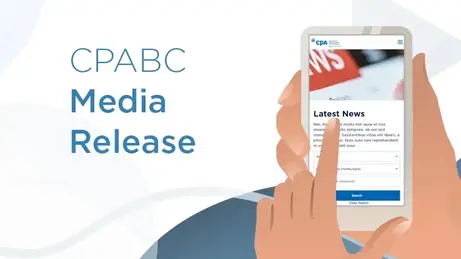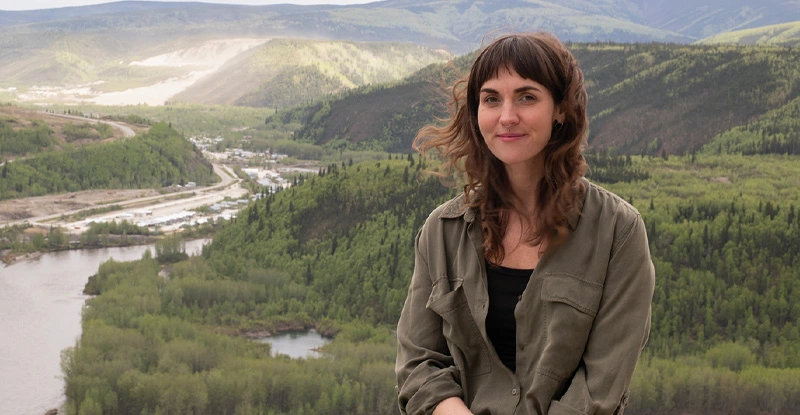
“Since the Klondike Gold Rush, Dawson City has drawn adventure seekers, artists, and misfits…it’s a place where beauty and magic happen.” Member of CPA Yukon Julia Spriggs, director of finance and operations at the First Nation School Board, shares what it’s like working as a CPA in Canada’s North.
“Dawson City is a community of 2,000, just below the Arctic Circle, at the end of the Yukon’s North Klondike Highway,” says Julia Spriggs, a member of CPA Yukon. “We live on the traditional territory of Tr’ondëk Hwëch’in First Nation who graciously share their space with us. What also makes Dawson special,” she continues, “is that since the Klondike Gold Rush, it has drawn adventure seekers, artists, and misfits. When you put that all into a tight-knit community at the end of the road, beauty and magic happen.”
We recently chatted with Julia, who is director of finance and operations at the First Nation School Board (FNSB), about her CPA career path, her role supporting student-centered education grounded in a Yukon First Nations worldview, and what it’s like working in accounting for organizations that create sustainable wealth for First Nations and advance economic reconciliation.
Career beginnings and unexpected setbacks
Julia began the CPA program in BC, finished it in Whitehorse, and received her accounting designation in 2017. “As soon as I designated,” she says, “I wanted to move back to Dawson, but I couldn’t take the leap without a job.” As it happened, she was offered a general manager position at a fuel company owned by the local First Nation in Dawson City. However, in her first week on the job, she says, “The CEO who hired me was on their way out and on their exit, they cleaned everyone. It felt like I got thrown out with the bathwater because early in your career, you think everything is the end of the world. So there I was – I had just moved back to Dawson and I had no job.”
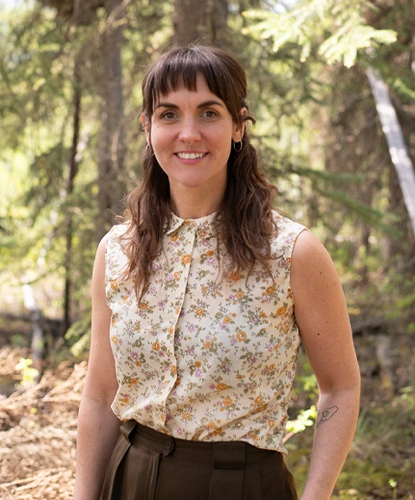 24 hours to refocus
24 hours to refocus
“I took a day to regroup,” says Julia. She spent the next year consulting, including as interim CFO for the City of Dawson, a role she had held during her accounting education. Then came a call from the CEO of Chief Isaac Group of Companies, the economic development corporation (EDC) for Tr’ondëk Hwëch’in First Nation. Typically, EDCs are community-owned businesses that serve as the economic arm of First Nations governments to drive economic growth, create jobs, and support the community. Julia continues, “The CEO said he thought I’d be a good fit as director of finance. I pointed out the role required 10 years of management experience, and I had just finished the CPA program. But he believed in me – he said if the fit is right and the technical skills are there, the management aspects can be learned.”
Julia stayed in this role for three-and-a-half years. “The organization had never had a finance director,” she notes, “so there was a lot of cleanup, plus the pandemic happened. I navigated corporate, tax, and debt restructures. It was an amazing opportunity – it really helped me see that I was in service to community in that role.” However, all of this progress came at a cost. “I just burnt myself out,” she says.
Advancing economic development from a holistic, Indigenous world view
Julia decided to take a new role as the chief reinvestment officer for the Na-Cho Nyak Dun Development Corporation, owned by the First Nation that neighbours Dawson City. “I ensured that we reinvested profits, mainly from mineral extraction, into the community, people, language, land, and culture,” she says. “I also worked with our industry partners to negotiate community benefits and ensured those commitments were kept.”
During this time, she says, “I learned how economic development can, and needs to be, done in a more holistic way and from a more Indigenous worldview.” Asked what this looks like, she explains, “I was tasked with creating economic opportunities for our citizens and community, but I realized that no matter how many jobs you create or projects you initiate, if you don’t have the people as number one – if it’s not relevant or values-based or something they care about culturally – it’s not going to work. And if our community isn’t well enough to participate, it’s just noise.”
To Julia, holistic economic development means “expanding the definitions of value and listening to what the community needs, especially when working for First Nations or Indigenous development corporations. It’s also a role where you are in service – so it’s about having humility and not assuming that you know what’s best.”
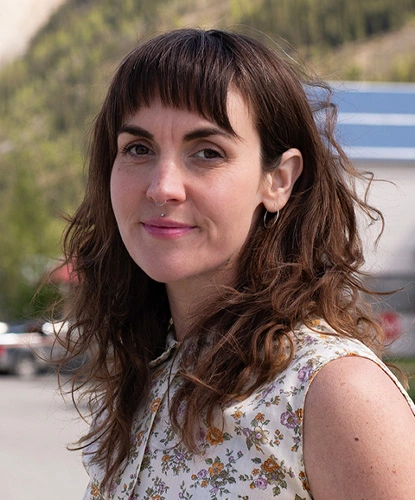 Building a foundation and a future at First Nation School Board
Building a foundation and a future at First Nation School Board
Julia’s current role at FNSB includes overseeing financial management, operational functions and administrative support. No two days look alike at the school board, which was established to enable Yukon First Nations to assume shared authority with Government of Yukon in the delivery of public-school education. “FNSB didn’t have a finance director until late in 2024 when I started,” she says, “and part of what I do is build a strong organizational foundation by creating and implementing processes and policies, and identifying gaps and strategies to address them.”
She continues, “We’ve recently established a technical working group with members from Yukon Government and FNSB to develop a new funding model for the school board. This is the most exciting work! If we can design a funding formula for our schools that is rooted in community wisdom and puts our learners at the center, that can be used as a template to reform how the other schools across the Yukon are funded and therefore reform public education in the Yukon. This makes my mind and heart explode a little.”
“My success was bigger than me”
Outside of work, Julia gives back including as a volunteer with the Dawson City Music Fest and Yukon First Nations Wildfire, and is currently a city council member. “My personal duty to serve my community drives me in everything I do. I truly feel like I was raised by this town,” she explains. “My parents separated when I was five and many people stepped in to support me and my family. For grades 7 to 10, I lived with my mom in Alberta and when I’d come back to Dawson for the summers, I started to notice that my success was bigger than me. People would ask, ‘How was your winter?’ I realized when I was sharing my stories, that they felt a part of it.
That’s when I started to learn that my success was bigger than me and it wasn’t my own to hold. I had an Elder once tell me that it’s our responsibility to go out and become educated and to gather knowledge and experience – but the knowledge we accumulate isn’t our own; it belongs to our community and it’s our responsibility to bring it back.”
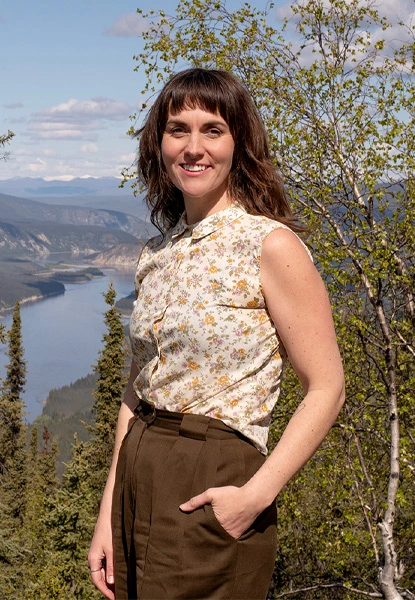 Advice for future CPAs
Advice for future CPAs
Thinking how her career experience might apply to people who want to become a CPA, Julia says, “Don’t let people pigeonhole you based on stereotypes of what an accountant is. For example, what fuels me the most is the opportunity to be creative and solve big challenges. I really love strategic visioning and strategic development – those big, high-level conversations and determining how to look at complex problems how to frame them. Those are skills that I learned through the CPA program.”
What’s next?
“I feel like every role I’ve had has been my dream job in the moment,” Julia continues. “What attracted to me to my last three accounting jobs is the creation and the building – I want to create, test, and fine-tune things – then hand them off. I’ve never thought of my future in terms of what I want to be – it’s more who I want to be, how I want to contribute, and how I want to move through the world.”
All photos courtesy of Miriam Behman.
Leah Giesbrecht is a communications specialist at CPABC.


